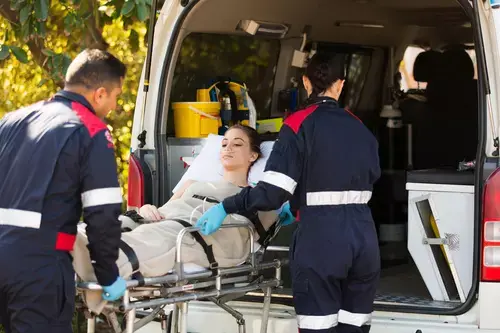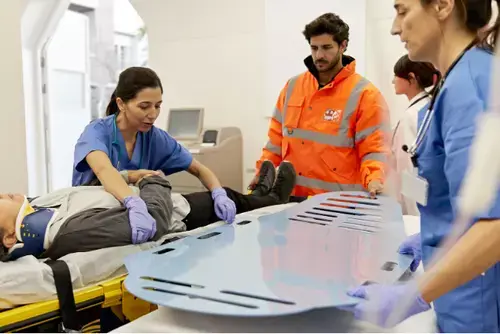HLTOUT007
Transport Non-Emergency Patients Under Operational Conditions
- Nationally Recognised Certificate
- Fast Certificate Turnaround
- Experienced and Certified Instructors
- Flexible Learning Options
- Industry Validated

Course Description
The unit HLTOUT007 – Transport Non-Emergency Patients Under Operational Conditions – equips individuals with the skills and knowledge to safely transport non-emergency patients in various healthcare and community settings. This unit is essential for professionals such as patient transport officers, healthcare drivers, and support staff who are responsible for transporting patients to and from medical appointments, care facilities, or between healthcare locations.
Throughout the course, participants will learn how to prepare vehicles for patient transport, assess patient needs, and ensure their comfort and safety during transit. The training covers proper patient handling techniques, use of appropriate equipment (such as stretchers and wheelchairs), and managing patients with varying mobility levels. Additionally, emphasis is placed on maintaining communication with healthcare teams, adhering to road safety regulations, and following protocols to ensure a smooth and safe transfer process.
This unit is ideal for healthcare workers, ambulance transport officers, and drivers who provide non-emergency patient transport services.
Upon completing HLTOUT007, participants will be equipped to transport non-emergency patients safely and efficiently, ensuring the highest standard of care and comfort during transit. This training is vital for promoting patient safety, adhering to operational procedures, and maintaining professional standards in patient transport services.
Units Delivered
The following units will be included in your certificate:
HLTOUT007
Transport non-emergency patients under operational conditions
Additional Information
Course Delivery
This course can be delivered/assessed in the workplace or at facility organised by the training provider.
Course Durations
Entry Requirements
An individual undertaking this course with Allens Training Pty Ltd will need to demonstrate the following to be eligible for entry:
- An official form of photo identification (e.g., driver’s licence, passport, or student ID).
- Students will be required to have a current Australian driver’s license to complete this unit.
- Physical capability to be able to meet the demands of the practical demonstration skills. This includes safely handling patients and equipment, working in confined or awkward spaces, and performing tasks that may involve bending, lifting, carrying, pushing, or pulling
- Protective slip resistant footwear/safety shoes and comfortable/practical clothing must be provided by the student and worn during the practical sessions and assessment.
To successfully complete this course, students will need to demonstrate the following language, literacy, numeracy and digital (LLND) skills during training and assessment:
- Learning: Follow detailed instructions, manage changing situations, and learn from feedback.
- Reading: Read and understand patient care notes, road maps, and emergency guidelines.
- Writing: Write clear and accurate records about patient care and transport details.
- Oral communication: Speak calmly and clearly with patients, team members, and emergency services.
- Numeracy: Check vital signs, read equipment specifications, and calculate times, weight or distances.
- Digital Literacy: Able to use a mobile phone or basic device to read messages, follow online instructions, complete online forms or access learning resources
Online learning: Students must have basic digital literacy skills to navigate online platforms, complete assessments, and access course materials. Before enrolment, students should assess their ability to engage in online learning. Support is available where required. The online learning program can be found in the student portal. Students must have access to a computer, smart phone, tablet or other electronic device with access to the internet to complete the online studies and associated assessment tasks.
Delivery mode: Online with face-to-face The online pre-course learning and theory assessment is expected to take approximately 8-9 hours to complete. These timeframes are estimates. Individuals with prior experience in similar training may complete the online component in less time, while those new to the subject may need more time to complete all the learning content and theory questions
Assessment Requirements
Individuals undertaking this course will be expected to complete both written and practical assessment tasks.
Certificate Renewal Requirements
This certificate does not require renewal
Learner Rights, Responsibilities & Support
Please note that enrolment to this course is made with Allens Training Pty Ltd RTO 90909. Please refer to the student handbook on our website for all details relating to rights and responsibilities including complaints and appeals.
Assessment Activities
Practical assessment:
- Performance Task – Vehicle Inspection
- Simulated Scenario – Loading and Unloading a patient
- Performance Task – Drive Under Operational Conditions
Documentation:
- Complete a Vehicle Inspection Checklist based on Performance Task – Vehicle Inspection
Theory assessment: A written exam consisting of multiple-choice and short answer questions must be completed at the end of the training session. Students must answer all questions
This course is delivered and assessed on behalf of Allens Training Pty Ltd RTO 90909
Other Training Options
All Courses
Apply Basic Principles and Practices of Infection Prevention and Control
The unit HLTINF006 – Apply Basic Principles and Practices of Infection Prevention and Control – equips individuals with the essential skills and knowledge to prevent and control infections in healthcare and community settings. This unit is crucial for workers in environments such as hospitals, aged care, disability services, and clinics, where maintaining hygiene and minimising infection risks are...
View Course
Manage Personal Stressors in the Work Environment
The unit HLTWHS006 – Manage Personal Stressors in the Work Environment – equips individuals with the skills and strategies to effectively manage personal stress in the workplace, particularly in high-pressure environments such as healthcare, community services, and other care-related industries. This unit is essential for workers who face demanding roles and need to maintain their well-being to pe...
View Course
Follow Safe Work Practices for Direct Client Care
The unit HLTWHS002 – Follow Safe Work Practices for Direct Client Care – equips individuals with the skills and knowledge to ensure safety when providing direct care to clients in healthcare, aged care, disability services, and community care settings. This unit is essential for workers who are responsible for maintaining their own safety, as well as the safety of clients, while delivering persona...
View Course
Implement Safe Access and Egress
The unit HLTOUT001 – Implement Safe Access and Egress – equips individuals with the knowledge and skills necessary to ensure safe entry and exit in various environments, particularly in healthcare, emergency, or community care settings. This unit is essential for professionals working in roles such as paramedics, healthcare workers, or support staff, where safe and efficient access to and from bui...
View Course